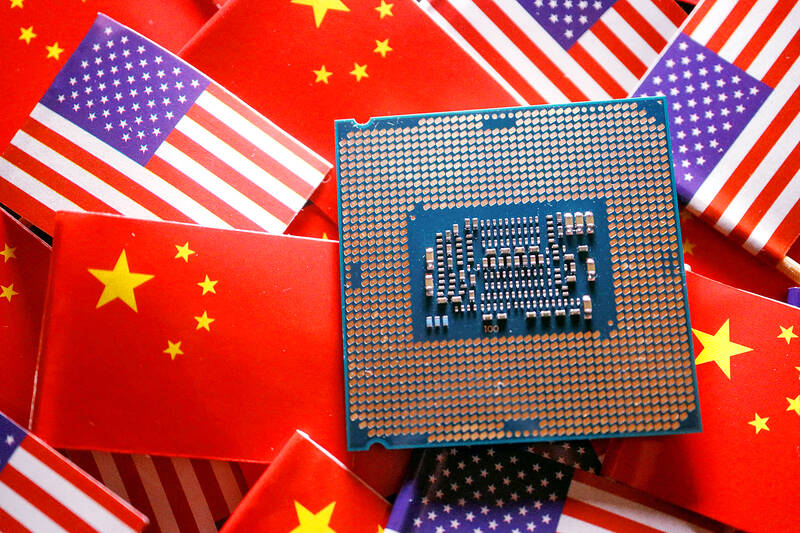US President Joe Biden’s administration on Monday said it is finalizing rules that would limit US investments in artificial intelligence (AI) and other technology sectors in China that could threaten US national security.
The rules, which were proposed in June by the US Department of the Treasury, were directed by an executive order signed by Biden in August last year covering three key sectors: semiconductors and microelectronics, quantum information technologies and certain AI systems.
The rules are to take effect on Jan. 2 next year and would be overseen by the Treasury’s newly created Office of Global Transactions.

Photo: Reuters
The Treasury said the “narrow set of technologies is core to the next generation of military, cybersecurity, surveillance and intelligence applications.”
The rules cover technologies such as “cutting-edge code-breaking computer systems or next-generation fighter jets,” US Assistant Secretary of the Treasury for Investment Security Paul Rosen said.
“US investments, including the intangible benefits like managerial assistance and access to investment and talent networks that often accompany such capital flows, must not be used to help countries of concern develop their military, intelligence and cyber capabilities,” he added.
The move is part of a broader push to prevent US know-how from helping China develop sophisticated technology and dominate global markets.
US Secretary of Commerce Gina Raimondo earlier this year said that the rules were crucial to prevent China from developing military-related technologies.
The new rules contain a carve-out allowing US investment in publicly traded securities, but the officials said the US already has authorities under a previous executive order barring buying and selling of securities of certain designated Chinese companies.
The US House of Representatives Select Committee on Strategic Competition between the US and the Chinese Communist Party has criticized major US index providers for directing billions of dollars from US investors into stocks of Chinese companies that the US believes are facilitating the development of China’s military.
The select committee has also urged the US Department of Commerce to examine national security threats from China’s development of silicon photonics technology, a fast-developing field that could speed up AI.
At its core, silicon photonics relies on light, rather than electrical signals, to move information inside of computer systems and has uses in AI systems where tens of thousands of computer chips are connected.
“The dual-use nature of photonics technology makes it particularly susceptible to military end-use diversion by problematic actors,” US representatives John Moolenaar and Raja Krishnamoorthi wrote in their letter on Monday.
“We’ve received the letter and will respond through the appropriate channels,” a commerce department spokesperson said.
China has been aggressively pursuing the technology, with Guangdong Province in the past few weeks joining a spate of funding programs aimed at building photonics chips in China, state media said.
“China has been perhaps the quickest state actor to mobilize the resources and encourage local and regional governments to work on photonic technology,” said Sunny Cheung (張崑陽), an associate fellow for China studies with the Jamestown Foundation who has studied China’s efforts in the field.

The US dollar was trading at NT$29.7 at 10am today on the Taipei Foreign Exchange, as the New Taiwan dollar gained NT$1.364 from the previous close last week. The NT dollar continued to rise today, after surging 3.07 percent on Friday. After opening at NT$30.91, the NT dollar gained more than NT$1 in just 15 minutes, briefly passing the NT$30 mark. Before the US Department of the Treasury's semi-annual currency report came out, expectations that the NT dollar would keep rising were already building. The NT dollar on Friday closed at NT$31.064, up by NT$0.953 — a 3.07 percent single-day gain. Today,

‘SHORT TERM’: The local currency would likely remain strong in the near term, driven by anticipated US trade pressure, capital inflows and expectations of a US Fed rate cut The US dollar is expected to fall below NT$30 in the near term, as traders anticipate increased pressure from Washington for Taiwan to allow the New Taiwan dollar to appreciate, Cathay United Bank (國泰世華銀行) chief economist Lin Chi-chao (林啟超) said. Following a sharp drop in the greenback against the NT dollar on Friday, Lin told the Central News Agency that the local currency is likely to remain strong in the short term, driven in part by market psychology surrounding anticipated US policy pressure. On Friday, the US dollar fell NT$0.953, or 3.07 percent, closing at NT$31.064 — its lowest level since Jan.

The New Taiwan dollar and Taiwanese stocks surged on signs that trade tensions between the world’s top two economies might start easing and as US tech earnings boosted the outlook of the nation’s semiconductor exports. The NT dollar strengthened as much as 3.8 percent versus the US dollar to 30.815, the biggest intraday gain since January 2011, closing at NT$31.064. The benchmark TAIEX jumped 2.73 percent to outperform the region’s equity gauges. Outlook for global trade improved after China said it is assessing possible trade talks with the US, providing a boost for the nation’s currency and shares. As the NT dollar

The Financial Supervisory Commission (FSC) yesterday met with some of the nation’s largest insurance companies as a skyrocketing New Taiwan dollar piles pressure on their hundreds of billions of dollars in US bond investments. The commission has asked some life insurance firms, among the biggest Asian holders of US debt, to discuss how the rapidly strengthening NT dollar has impacted their operations, people familiar with the matter said. The meeting took place as the NT dollar jumped as much as 5 percent yesterday, its biggest intraday gain in more than three decades. The local currency surged as exporters rushed to